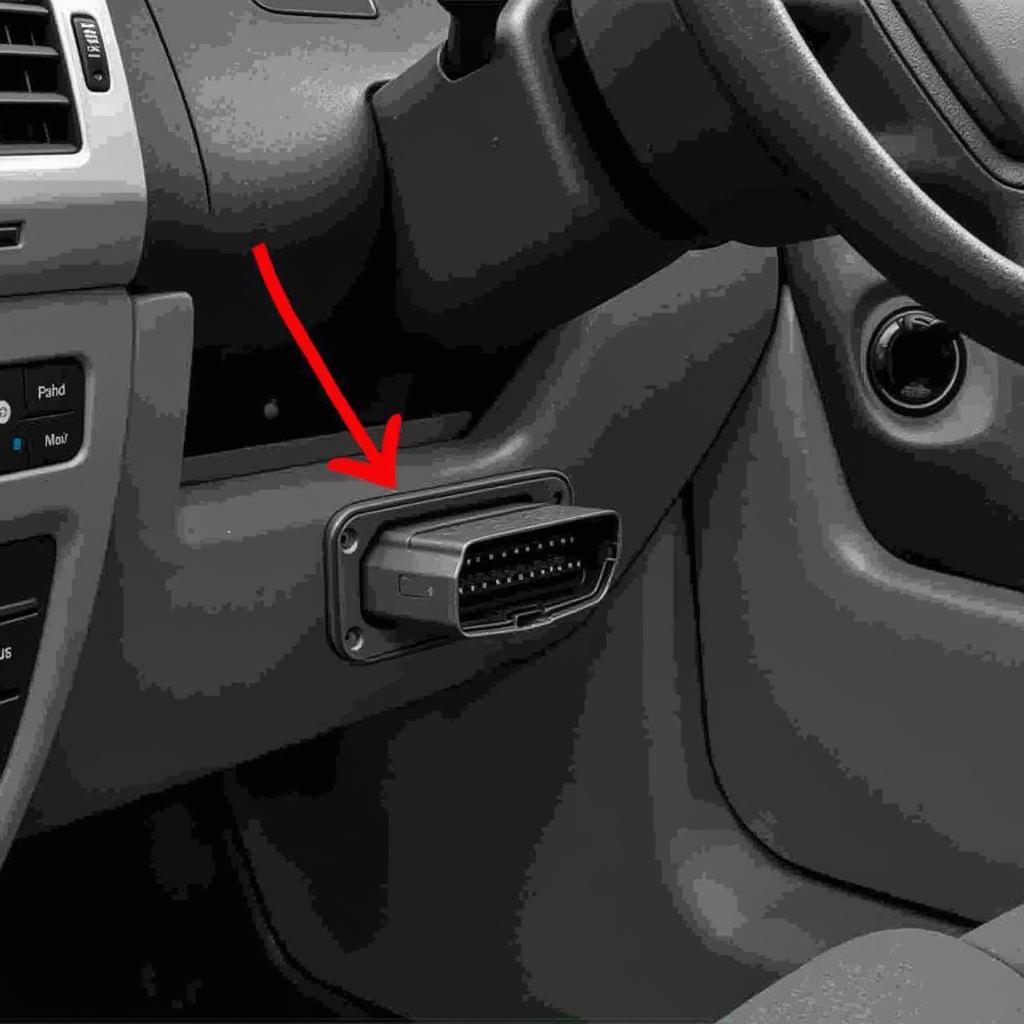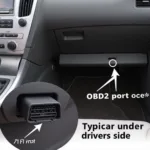Diagnostica OBD2 is a term car owners might come across when dealing with vehicle diagnostics. But what does it really mean, and how can this technology help you? This comprehensive guide delves into the world of OBD2 diagnostica, exploring its capabilities, benefits, and how it empowers you to understand your car’s health better.
Demystifying OBD2 Diagnostica: What Does It Mean?
OBD2, short for On-Board Diagnostics, second generation, is a standardized system present in modern vehicles. It acts as your car’s internal communication network, constantly monitoring various systems and components. Diagnostica OBD2 refers to the process of accessing and interpreting the data stored within this system. This data, often in the form of Diagnostic Trouble Codes (DTCs), provides valuable insights into your car’s health, performance, and potential issues.
How Does OBD2 Diagnostica Work?
At the heart of OBD2 diagnostica lies the OBD2 port, a standardized 16-pin connector typically located under the dashboard on the driver’s side. Connecting a specialized tool, known as an OBD2 scanner, to this port allows you to tap into the vehicle’s computer and access the treasure trove of data it stores.
OBD2 scanners come in various forms, from basic code readers to advanced professional-grade tools. These scanners act as translators, converting the complex data from your car’s computer into understandable information. This information can range from simple details like engine RPM and coolant temperature to more complex data streams related to emissions, fuel efficiency, and sensor readings.
The Power of OBD2 Diagnostica: Unlocking Your Car’s Secrets
Diagnostica OBD2 offers a range of benefits for car owners, empowering them with knowledge and control over their vehicles:
1. Early Problem Detection: OBD2 diagnostica allows you to identify potential issues before they escalate into costly repairs. By monitoring DTCs and real-time data, you can catch warning signs early on.
2. Accurate Diagnostics: Gone are the days of relying solely on a mechanic’s intuition. Diagnostica OBD2 provides concrete data, allowing for more accurate diagnosis and targeted repairs.
3. Enhanced Transparency: With access to your car’s data, you gain transparency into its performance, maintenance history, and potential issues. This knowledge empowers you to make informed decisions about repairs and maintenance.
4. DIY Potential: Basic OBD2 scanners are readily available and user-friendly, allowing car enthusiasts to perform basic diagnostics and troubleshooting themselves.
5. Improved Fuel Efficiency: By monitoring parameters like fuel trim and oxygen sensor readings, you can identify potential issues impacting fuel efficiency and take corrective measures.
Beyond Basic Diagnostics: Advanced Capabilities of OBD2 Diagnostica
While retrieving and understanding DTCs is a fundamental aspect of OBD2 diagnostica, the technology offers far more advanced capabilities:
- Live Data Monitoring: Access and analyze real-time data streams from various sensors and systems, providing insights into your car’s performance under different driving conditions.
- Performance Tracking: Monitor parameters like acceleration, braking, and fuel consumption to track performance and identify potential areas for improvement.
- Emissions Testing Readiness: Check your car’s emissions system readiness status before undergoing official emissions tests, ensuring compliance and avoiding potential failures.
- Customization and Tuning: Some advanced OBD2 scanners allow for vehicle customization, such as adjusting shift points, idle speed, and other parameters (within safe limits).
Choosing the Right OBD2 Scanner: A Guide for Car Owners
Navigating the world of OBD2 scanners can be daunting, with a wide range of options available. Consider these factors when selecting a scanner:
- Functionality: Determine your needs and the level of detail you require. Basic code readers are sufficient for retrieving and clearing DTCs, while advanced scanners offer live data, graphing, and other features.
- Compatibility: Ensure the scanner is compatible with your vehicle’s make, model, and year.
- User Interface: Choose a scanner with a user-friendly interface, clear displays, and intuitive navigation.
- Additional Features: Consider features like Bluetooth connectivity, data logging, and software updates for enhanced functionality.
FAQs: Common Questions about Diagnostica OBD2
1. Can I use any OBD2 scanner on my car?
While the OBD2 port is standardized, not all scanners are universally compatible. It’s crucial to choose a scanner that supports your car’s make, model, and year.
2. What do the different lights on my dashboard mean?
Dashboard warning lights are linked to your car’s OBD2 system. When a problem is detected, a specific warning light illuminates. An OBD2 scanner can help identify the specific issue triggering the light.
3. Can I fix my car myself using an OBD2 scanner?
While an OBD2 scanner can help pinpoint issues, it’s essential to remember it’s a diagnostic tool, not a magic fix. Depending on the complexity of the problem, professional assistance may be required.
4. How often should I use an OBD2 scanner on my car?
Regularly scanning your car, ideally every few months or before long trips, can help catch potential issues early.
5. Where can I learn more about specific OBD2 codes?
Online resources, automotive forums, and your car’s owner’s manual can provide detailed information about specific DTCs and their meanings.
Conclusion: Empowering Car Owners Through Knowledge
Diagnostica OBD2 has revolutionized how we understand and interact with our vehicles. By providing access to vital data and insights, this technology empowers car owners with knowledge, allowing for informed decision-making, proactive maintenance, and a deeper understanding of their cars’ health. As technology advances, OBD2 diagnostica will continue to play an even more significant role in the automotive landscape.
Need expert advice on choosing the right OBD2 scanner or understanding your car’s diagnostics? Contact us on WhatsApp at +1(641)206-8880 or email us at [email protected]. Our 24/7 customer support team is always here to assist you.


